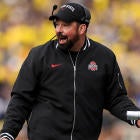The NCAA's Division I Council on Friday voted in favor of an early signing period, which should dramatically alter the college football recruiting landscape in the future.
The legislation was part of an extensive bundled, congressional-like bill and aims to accomplish the following...
- Changing the recruiting calendar to allow for an early signing period in December (effective Aug. 1). Only the Collegiate Commissioners Association can create new National Letter of Intent signing periods.
- Adding a period for official visits that begins April 1 of the junior year and ends the Sunday before the last Wednesday in June of that year. Official visits can't occur in conjunction with a prospect's participation in a school's camp or clinic (effective Aug. 1).
- Preventing Football Bowl Subdivision schools from hiring people close to a prospective student-athlete for a two-year period before and after the student's anticipated and actual enrollment at the school. This provision was adopted in men's basketball in 2010 (effective immediately, though schools may honor contracts signed before Jan. 18, 2017).
- Football Bowl Subdivision schools would be limited to signing 25 prospective and current student-athletes to a first-time financial aid agreement or a National Letter of Intent. Exceptions would exclude current student-athletes who have been enrolled full-time at the school for at least two years and prospective or current student-athletes who suffer an incapacitating injury (effective for recruits who sign after Aug. 1, 2017).
- Limiting the time for Football Bowl Subdivision coaches to participate in camps and clinics to 10 days in June and July and requires that the camps take place on a school's campus or in facilities regularly used by the school for practice or competition. Staff members with football-specific responsibilities would be subject to the same restrictions. The Football Championship Subdivision can conduct and participate in camps during the months of June and July (effective immediately, though schools may honor contracts signed before Jan. 18, 2017).
- Allowing coaches employed at a camp or clinic to have recruiting conversations with prospects participating in camps and clinics and requires educational sessions at all camps and clinics detailing initial eligibility standards, gambling rules, agent rules and drug regulations (effective immediately).
- Allowing Football Bowl Subdivision schools to hire a 10th assistant coach (effective Jan. 9, 2018).
Additionally, the council voted to eliminate two-a-days in the preseason.
Decisions are not final until April 26 at the conclusion of the Division I Board of Directors meeting. The Collegiate Commissioners Association, which must approve the changes to the recruiting calendar and early signing period, is expected to rubber stamp it when it meets in June.
"Today's adoption of the football legislation marks the most significant progress in recent years to improve the football environment and culture for current and prospective student-athletes and coaches," said Jim Phillips, Northwestern's vice president for athletics. "Importantly, the action of the NCAA Division I Council delivers on the charge of the Division I Board of Directors to comprehensively improve the football recruiting environment. This affirms that the new Division I governance structure can effectively and timely address important issues."
There has been little consensus over the years about an early signing period, so the fact that this all-encompassing legislation has been approved by the NCAA Division I Council is significant -- at least for the time being. Earlier this week, Big 12 commissioner Bob Bowlsby told CBS Sports' Dennis Dodd that the full scope of the proposal was "the most impactful piece of football recruiting legislation in 25 years."
How this proposal ultimately looks remains to be seen, however.





















